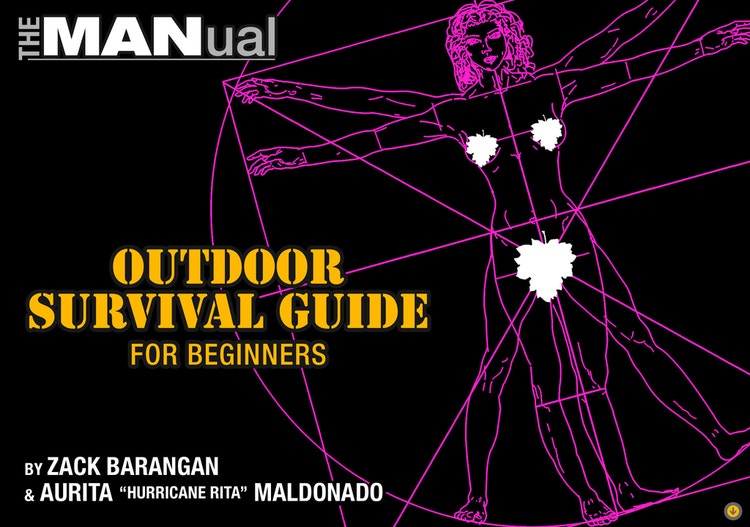
The MANual: Outdoor Survival Guide for Beginners
A few hundred years ago our ancestors could survive alone in the most dangerous terrain and conditions with no GPS, camp stove, moisture wicking gear, or fancy hiking boots. However, with the unchecked pace at which society has grown towards a desk jockey work force with manicured lawns and nails, things have changed. If you are not one of the nearly endangered species of outdoorsmen in this age of technology, I have a few tips to help you survive should you find yourself in the wilderness overdressed and under-skilled for the occasion.
THE MOST IMPORTANT SURVIVAL SKILL OF ALL: Before you take off on your adventure, tell somebody you trust where you are going and a time to expect your return. Seriously. TELL SOMEBODY. In this age of connectivity, that could be as simple as an email, phone call, or Facebook message.
If you haven't used the most important survival skill of all, and find yourself surrounded by nothing but trees you can't identify with nobody who knows even a general direction to come look for you, follow the SECOND MOST IMPORTANT SURVIVAL SKILL OF ALL: DON'T PANIC!
Just S.T.O.P!!!!!
Stop moving, sit down, and breathe.
Think back through where you could have made a mistake.
Observe your surroundings.
Plan your next move.
Obviously if you saw a close town from high ground while observing, walk towards it. A river, stream or creek? Follow it. Not only will it provide you with a source of water, but most likely will lead you back to a trail or road you can follow to civilization.
If the temperature is dropping, the day is waning, or it looks like a storm is approaching, your focus should shift to the basics of outdoor survival: shelter and fire. It takes weeks to die of hunger, days to die of thirst, but mere hours to die if you are left to severe elements without some sort of protection.
SHELTER
A cold, rainy night can make a stressful situation into an absolute tragedy without shelter. Look for natural features that could help or eliminate the building process like a cave or fallen tree. A large tree with thick, low branches can serve as great shelter as well. Be sure if you are following water that you choose a spot on higher ground, out of the reach of a flash flood. The temperature down by the water tends to be colder and damper than higher ground (imagine that).
Create a bed frame from limbs or rocks. Begin to collect everything you can find that is dry and soft i.e. leaves, pine needles, moss. Outdoorsmen call this duff. Desk jockeys call this leaves, pine needles, and moss. Fill your bed frame with the duff you've collected. The barrier this will create between yourself and the cold ground will help you conserve heat through the night. Beware of critters in your duff. Lastly, make sure there are no “widow makers” threatening to ruin your night.
FIRE
You've found shelter or tied up your tarp, collected your duff, now what? Build a fire! You've not done that in the wilderness before? Not familiar with the bow drill technique? Hmmm…What did you bring along on your adventure? Hopefully at the very least you brought some waterproof matches or a bright colored butane lighter. Butane lighters are cheap, light weight, last a while, and bright colored ones are easy to see if dropped. In cold conditions, the liquid inside may freeze. The simple solution? Carry these little guys in your pocket.
You have the mechanism, now what are you going to try to ignite? You must collect tinder, kindling, and fuel. In desk jockey, this is really fine dry plant matter, pencil to thumb size sticks, and wrist or arm size branches. What did you bring with you that is flammable?
Before trying to burn anything, you should definitely build your fire site. Clear a space and line it with rocks. Make sure you have a dry surface to work on if possible. I like to make a teepee shape out of the kindling with a gap to place my tinder bundle once it has caught. Remember, a large fire takes a large amount of work. Keep it small.
WATER AND FOOD
Honestly, this should be the last of your immediate concerns in a survival situation. Collect water in your metal, flame resistant water bottle that you brought with you from a clear, moving source and boil it for at least 10 minutes over the expert fire you just started. I highly recommend carrying Aerobic Oxygen with you when going to the wilderness just in case. That way if you ABSOLUTELY have to drink stagnant water as a LAST RESORT and cannot find a way to boil it, you can do so without too much fear.
Food?
Don't eat it unless you recognize the plant beyond a doubt. Don't waste time or risk injury trying to make dead fall traps or catch fish by hand like you saw on TV. I will say again, you can last WEEKS without food in the wilderness! Besides, you could pay penance with a few pounds for getting lost and not telling anyone where you were going in the first place!